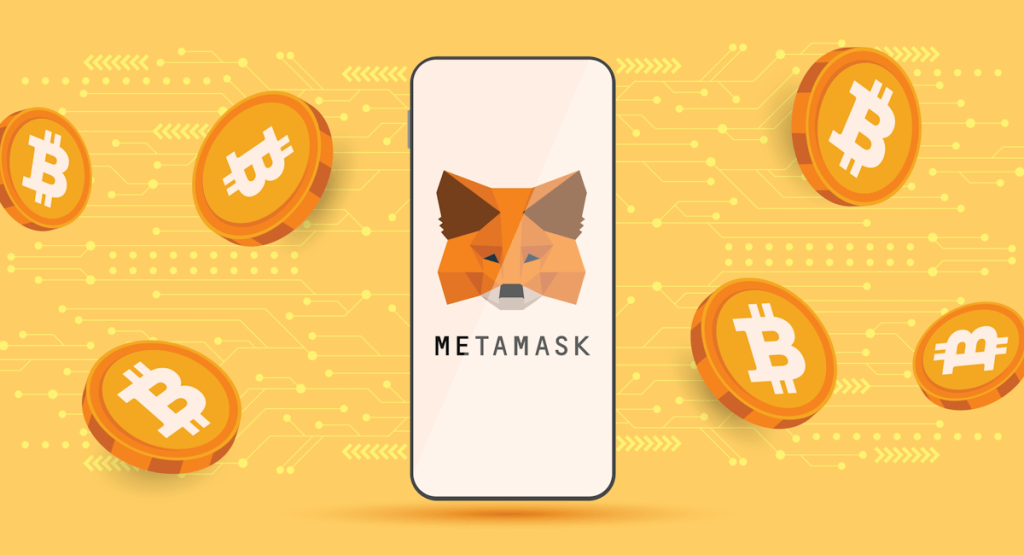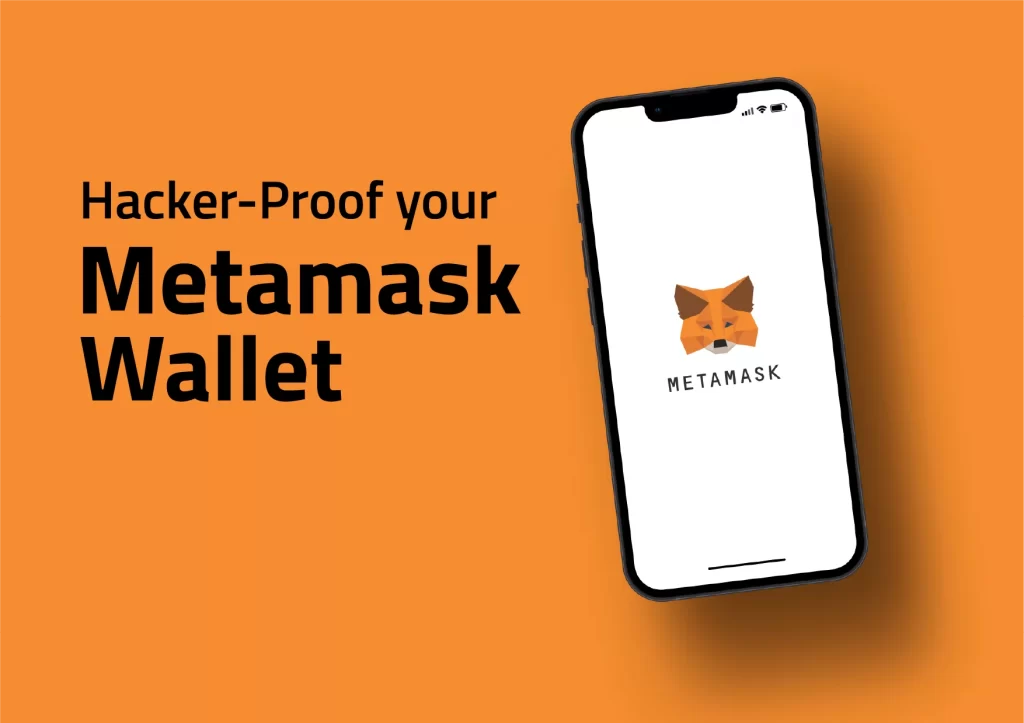
No, MetaMask is not 100% safe; it relies on user practices. Follow security measures to minimize risks.
Understanding MetaMask Security
Encryption and Key Management
MetaMask ensures the security of user data and private keys through advanced encryption:
- Local Storage Encryption: Private keys and seed phrases are encrypted and stored locally on the user’s device.
- Secure Backup: Users receive a seed phrase to store offline for wallet recovery.
- Non-Custodial: Users retain full control over their private keys, reducing risks associated with centralized exchanges.
Password Protection
Password protection is key to MetaMask’s security:
- Strong Passwords: Users must create a strong, unique password to access their wallet.
- Auto-Lock Feature: MetaMask locks the wallet after inactivity, requiring a password to unlock.
- Encrypted Passwords: Passwords are encrypted and stored securely, protecting against unauthorized access.

Common Security Risks
Phishing Attacks
Phishing attacks are a significant threat to MetaMask users:
- Fake Websites: Scammers create fake websites that mimic the MetaMask interface to steal login credentials and seed phrases. Always verify the website URL before entering any sensitive information.
- Malicious Links: Phishing emails and messages may contain links to fraudulent sites. Avoid clicking on links from unknown or suspicious sources.
- Browser Extensions: Only download the MetaMask extension from official sources like the Chrome Web Store or the MetaMask website to avoid fake or malicious extensions.
Malware and Browser Vulnerabilities
Malware and browser vulnerabilities can compromise the security of your MetaMask wallet:
- Keyloggers: Malware can record keystrokes to capture your MetaMask password and seed phrase. Use reputable antivirus software to protect your device.
- Browser Exploits: Vulnerabilities in your browser can be exploited to gain unauthorized access to your MetaMask wallet. Regularly update your browser to the latest version to protect against known exploits.
- Suspicious Extensions: Other browser extensions can interact with MetaMask, potentially compromising security. Only install trusted extensions and regularly review the permissions granted to them.
Best Practices for Security
Keeping Your Seed Phrase Safe
Your seed phrase is the key to your MetaMask wallet. Ensuring its safety is crucial:
- Offline Storage: Write down your seed phrase and store it in a secure, offline location. Avoid digital copies that can be hacked.
- Multiple Copies: Create multiple copies of your seed phrase and store them in different secure places to prevent loss.
- Avoid Sharing: Never share your seed phrase with anyone. No legitimate service will ever ask for it.
- Secure Containers: Use a fireproof and waterproof container to protect your written seed phrase from physical damage.
Enabling Two-Factor Authentication
While MetaMask does not natively support two-factor authentication (2FA), you can enhance security through additional methods:
- Use with Hardware Wallets: Integrate MetaMask with hardware wallets like Ledger or Trezor, which offer 2FA for transactions.
- Secure Device: Ensure your device has 2FA enabled for logging in. This adds an extra layer of security before accessing MetaMask.
- Security Apps: Use security apps that provide additional layers of authentication for your device.

Comparing MetaMask to Other Wallets
MetaMask vs. Hardware Wallets
MetaMask:
- Accessibility: Easily accessible as a browser extension and mobile app.
- Ease of Use: User-friendly interface ideal for both beginners and advanced users.
- Connectivity: Convenient for quick transactions and interaction with DApps.
- Security: Relies on the security of the device it’s installed on; vulnerable to phishing and malware attacks if not properly secured.
Hardware Wallets (e.g., Ledger, Trezor):
- Accessibility: Physical devices that must be connected to a computer or mobile device for transactions.
- Ease of Use: Slightly more complex to set up and use compared to software wallets.
- Connectivity: Limited interaction with DApps; often requires bridging with software wallets like MetaMask.
- Security: Highly secure as private keys are stored offline; immune to malware and phishing attacks. Ideal for long-term storage of large amounts of cryptocurrency.
MetaMask vs. Other Software Wallets
MetaMask:
- Network Support: Primarily supports Ethereum and EVM-compatible networks like Binance Smart Chain and Polygon.
- DApp Integration: Excellent integration with a wide range of DApps directly from the browser extension or mobile app.
- User Base: One of the most popular software wallets with a large user community and extensive support resources.
- Customization: Supports custom network settings and multiple account management.
Other Software Wallets (e.g., Trust Wallet, Coinbase Wallet):
- Network Support: Often support a broader range of blockchains and tokens, including Bitcoin, Ethereum, Binance Chain, and more.
- DApp Integration: Trust Wallet includes a built-in DApp browser for mobile, while Coinbase Wallet offers seamless integration with Coinbase services.
- User Base: Also popular with robust communities and support, but vary in specific features and network compatibility.
- Security Features: Comparable security features, including biometric authentication, encrypted storage, and seed phrase backup.

User Responsibilities
Regular Software Updates
Keeping your wallet software up to date is crucial for security and functionality:
- Install Updates Promptly: Regularly check for and install updates for MetaMask, your browser, and your device’s operating system. Updates often include important security patches that protect against new threats.
- Enable Automatic Updates: Whenever possible, enable automatic updates to ensure you are always running the latest version of the software.
- Check Release Notes: Review release notes for updates to understand new features and security improvements.
Vigilance Against Scams
Being aware and cautious can help protect you from scams:
- Verify URLs: Always double-check URLs before entering your wallet information. Only use the official MetaMask website and trusted links.
- Avoid Phishing Scams: Be cautious of emails, messages, or websites that request your seed phrase or private keys. MetaMask will never ask for these details.
- Use Security Extensions: Consider using browser security extensions that can help detect and block phishing websites.
- Educate Yourself: Stay informed about common scams and new phishing tactics. Follow MetaMask’s official channels for updates on security practices and known threats.
- Report Suspicious Activity: If you encounter a suspicious website or potential scam, report it to MetaMask and other relevant authorities.

Community and Developer Audits
Open Source Benefits
MetaMask being open-source offers numerous security and community benefits:
- Transparency: The source code is publicly available, allowing anyone to inspect it for vulnerabilities or malicious code. This transparency builds trust among users.
- Community Contributions: Developers from around the world can contribute to the codebase, improving the wallet’s functionality and security.
- Rapid Issue Identification: The community can quickly identify and report bugs or security issues, leading to faster resolutions.
- Customization: Users and developers can create custom versions of MetaMask tailored to specific needs, enhancing its versatility.
Third-Party Security Audits
Third-party security audits play a crucial role in ensuring the robustness of MetaMask:
- Professional Reviews: Independent security firms regularly audit MetaMask’s codebase, providing an unbiased assessment of its security.
- Vulnerability Testing: These audits include thorough testing for vulnerabilities, such as potential exploits or weaknesses in the encryption mechanisms.
- Certification: Successful audits can lead to security certifications, further validating MetaMask’s safety for users.
- Public Reports: Audit results are often made public, providing users with detailed information on the security measures and any issues found and resolved.

MetaMask Support and Resources
Accessing Official Support
MetaMask provides various official support channels to assist users:
- Help Center: Visit the MetaMask Help Center for a comprehensive collection of FAQs, troubleshooting guides, and detailed articles on using MetaMask.
- Submit a Ticket: If you need personalized assistance, you can submit a support ticket through the Help Center for direct help from MetaMask’s support team.
- Security Alerts: Keep an eye on the official MetaMask website and support pages for updates on security alerts and best practices.
Community Advice and Tips
The MetaMask community is an excellent resource for additional support and advice:
- MetaMask Community Forum: Join discussions on the MetaMask Community Forum to ask questions, share experiences, and get help from other MetaMask users.
- Reddit: Participate in the MetaMask subreddit to engage with the community, read user-generated guides, and find solutions to common issues.
- Social Media: Follow MetaMask on Twitter for the latest updates, tips, and announcements. Engaging with MetaMask’s social media can provide quick insights and real-time support.
- YouTube Tutorials: There are many user-generated tutorials on YouTube that can help you with various aspects of using MetaMask, from setup to advanced features.
- GitHub: For technical support and contributions, visit the MetaMask GitHub. Here, developers can report issues, suggest improvements, and contribute to the codebase.